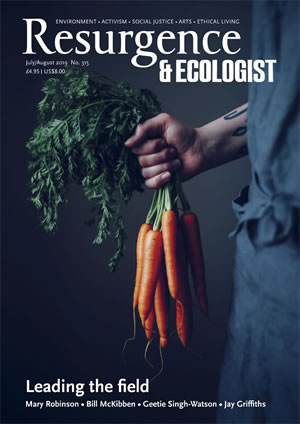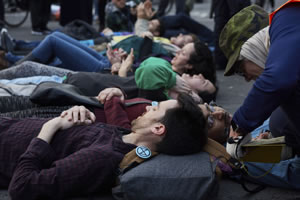Part of XR’s strategy leading up to Rebellion Week involved looking at how “nonviolent movements require a shift in the loyalty of the security services” – do you think you have achieved that so far?
I don’t think at this stage we could ever really know if we’ve achieved that. We saw that during the rebellion several police officers on the ground gave interviews to the press to say they were in support and were going to bring their families down when they were off duty. I’m inclined to believe them. They have children and families and do care about this issue. They are also trained to engage and befriend the general public in that kind of situation.
Some protesters were chanting “We love the police”.
Was that part of this strategy?
I think it’s really important that we’re really clear that this is nonviolent civil disobedience and it is strategic to sit on the ground respectfully and react peacefully if the police do arrest you, and go through that arrest process in a peaceful and respectful way. I think it’s also really important that the strategy lays out that we’re not there to make a moral judgement on the way the police act, or on the justice system. As with many issues, people who are part of XR have a whole range of opinions on that and because it’s a mass movement we’ll be sitting in the road with people who have completely different politics to us but we’re all behind the issue that we want a future for our children, and we’re all willing to undertake civil disobedience for that. Any chanting for or against the police could be quite divisive in a mass protest situation because you’re potentially dividing the movement.
Did this add fuel to criticism – for example, that XR is a white middle-class movement [because positive interactions with the police might be more likely if you are from this strata of society]?
I think it has received a lot of criticism. There was a lot of criticism back at the Declaration of Rebellion and one individual spoke about their relationship with the police. We’ve tried with this strategy over the last three months to change and improve that. There are still a whole range of people with different opinions on this. That’s another reason why it’s very difficult as a mass movement to respond directly to some of those criticisms because any meeting we have about those discussions will get a whole range of responses.
How can you make sure those people are listened to?
As part of the movement’s strategy team we’ve organised a listening forum for activist groups, particularly activist groups around climate justice issues and monitoring the police, and we’ve held one of these so far with the intention to hold more. It was an opportunity to really hear out some of the groups, learn from them and have questions answered from within the movement.
We held it in London. As groups elsewhere get bigger, they might be able to do a similar thing.







